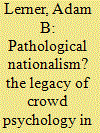| Srl | Item |
| 1 |
ID:
185865


|
|
|
|
|
| Summary/Abstract |
This article investigates the intellectual history of nationalism in International Relations theory, asking how early generations of scholars understood the phenomenon and its relationship to chauvinism and violence. Despite substantial disagreements and varied intellectual influences, I argue that both interwar liberals and postwar realists shared several problematic assumptions about nationalism's pathological character that limited their imagination of its varied potential impacts. I trace these common assumptions back to the bigoted interdisciplinary field of crowd psychology, most prominently evangelized by Gustave le Bon. Le Bon's 1895 The crowd became a touchstone for subsequent generations of social and political theorists and spread ideas about nationalism that infused incipient international theory. Even as his popularity faded, his uniquely pessimistic, racist and sexist ideas about mass politics lingered in mainstream IR's narrow engagement with the phenomenon. By excavating this history, this article exposes a problematic thread that has been woven into the IR discipline, as well as a potential path to excising this bigoted thinking and nuancing discussions of the rise of nationalism in the twenty-first century.
|
|
|
|
|
|
|
|
|
|
|
|
|
|
|
|
| 2 |
ID:
170362


|
|
|
|
|
| Summary/Abstract |
While existing literature on collective trauma in international relations represents a vital (albeit inchoate) contribution to the field, to date, it has largely analyzed collective trauma’s impact as primarily psychological and sociocultural. This essay argues that a complete vision of collective trauma in IR must incorporate not only these more intangible dimensions but also how its legacy is reified materially over time in economic conditions—distinguishing the trauma of those with the resources to “work through” and those without. I begin this essay with a novel conception of collective trauma that draws upon existing traditions’ insights but also facilitates mediation between collective trauma’s material and sociocultural dimensions. Employing this definition, I then outline three analytical frameworks via which future scholarship can address collective trauma in international economic relations. First, scholarship can incorporate a notion of the trauma of poverty. Second, scholars can analyze the loss of economic opportunity that trauma entails as akin to Dominick LaCapra’s concept of structural trauma of absence. Finally, scholarship can examine collective trauma’s ability to break down trust in institutions and the impact this breakdown has on international economic relations.
|
|
|
|
|
|
|
|
|
|
|
|
|
|
|
|
| 3 |
ID:
179799


|
|
|
|
|
| Summary/Abstract |
On the campaign trail, then-candidate Donald Trump expressed a desire to pioneer an unpredictable US foreign policy that would both deceive opponents and disrupt the status quo. Academic and media commentators readily labelled this Trump’s ‘Unpredictability Doctrine’ and have since debated its merits and demerits. Beyond inevitable partisan divides, however, these responses also revealed enormous disagreement over conceptualizations of unpredictability and its impacts, raising fundamental questions for the IR discipline and the foreign policy analysis it informs. What are the ontological and epistemological roots of unpredictability in international politics? How can scholars simultaneously grapple with the conundrums posed by erratic actors and the larger, ever-changing systems they shape? This article unravels the philosophy of science (PoS) issues inherent in theorizing unpredictability, offering a novel, synthesized typology. Recognizing that PoS assumptions both frame accounts of unpredictability and represent a source of uncertainty, this article instead advocates epistemological humility, offering a new typology that transcends assumptions and facilitates dialogue between camps. This typology includes three ‘buckets’ of unpredictability – risk, uncertainty and complexity – that can be interpreted according to varying philosophy of science traditions. When applied empirically, this terminology helps contextualize analysis and expose oftentimes overlooked contours of US foreign policymaking.
|
|
|
|
|
|
|
|
|
|
|
|
|
|
|
|